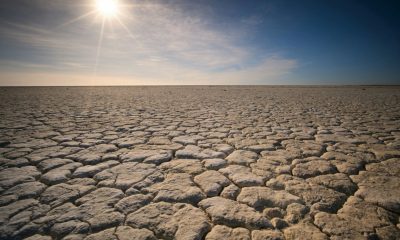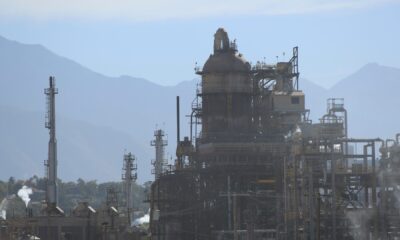Africa
African Energy Investments: Namibia and Guyana Are Outpacing Historic Producers
Guyana has become a significant player in energy with its recent large oil discoveries and investor-friendly policies, serving as a model for Namibia, which is also attracting substantial investments due to similar promising discoveries and proactive government measures. Nigeria, on the other hand, is struggling to attract necessary investments due to security issues and legal uncertainties.

The major players in global energy production are well-known, especially in the oil and gas sector, where many have been established for a long time, with African countries like Algeria, Nigeria, Libya, Egypt, and Angola having been in the market for decades, even though much of their resources remain untapped.
When new discoveries are made in previously unexplored or under-explored countries, one might think that these more experienced nations would be able to outpace them in attracting investments. However, recent experience shows that this is not always the case.
Download the free Born2Invest news app for more of the latest African energy sector news.
Guyana On a Rapid Ascent in the African Energy Sector
If there were a Rookie of the Year award in the energy sector, it would go to the South American country of Guyana, hands down. Although it is the immediate neighbor of Venezuela, a founding member of OPEC, most of Guyana’s 11 billion barrels of potential were only discovered in 2015. Less than five years after the initial discovery of the Stabroek block, American oil giant ExxonMobil began producing oil as part of the first phase of its Liza project, remarkably fast by industry standards. By April of this year, ExxonMobil had already approved its sixth oil project in Guyana, putting this African country of 800,000 inhabitants on track to one day surpass Venezuela in terms of total crude production. Today, this Latin American country is one of the fastest-growing economies in the world.
Namibia Shows Promising Potential
This is not the first time Guyana has been mentioned in energy discussions about the African energy sector, and there is a reason for that. Namibia is currently in the same situation that Guyana was in just a few years ago, ready to choose its path.
Recent discoveries in the Orange Basin in Namibia suggest that it could contain up to three billion barrels of oil and 8.7 trillion cubic feet of natural gas, and the country’s total oil reserves could be almost equal to those of Guyana, with about 11 billion barrels. The excitement over these newly discovered resources is great, and although oil and gas production is still to come, Namibia has become a leader in oil and gas sector investments in Africa.
Shell (UK) and TotalEnergies (France), who made the major discoveries in the Orange Basin with partner companies, have both committed substantial shares of their 2024 exploration budgets to ongoing activities in Namibia.
African offshore exploration plans have also been announced by Chevron (US), Azule Energy (a joint venture between Italy’s Eni and Britain’s BP), and the Portuguese energy group Galp. Additionally, Reconnaissance Energy Africa (Canada) and the Namibian national oil company NAMCOR have started drilling an onshore oil and gas exploration well in northeastern Namibia.
African Energy Lessons from Nigeria: What Not to Do
The enthusiasm for the resources in Guyana and Namibia is significantly different from what is observed in other resource-rich African countries. Take Nigeria, by far Africa’s largest oil producer, for example. Despite colossal proven reserves of nearly 37 billion barrels (the global total is 1.73 trillion), Nigeria is currently struggling to attract the $25 billion in annual investments needed to maintain its production at around 2 million barrels per day (bpd). Major oil companies are disengaging from Nigerian assets and redirecting their future investments to other countries, as TotalEnergies did by announcing $6 billion for new projects in Angola. No new exploration wells have been drilled in Nigeria for over 12 years. Why?
Security Concerns
The most obvious reason is security. Nigeria is known for its disastrous environmental spills caused by oil theft, vandalism, and sabotage. The country’s inability to protect its most valuable economic asset, which accounts for nearly two-thirds of Nigeria’s revenues, poses a constant threat to the security of employees as well as the profits of oil producers, not to mention that it does no favors for public relations. There may be a ton of money under Nigerian soil, but it’s going nowhere, so it makes more sense to extract it in a safer place until these issues are resolved.
Legal Uncertainty
Another major problem related to exploitation in Nigeria is legal uncertainty. As Patrick Pouyanné, CEO of TotalEnergies, stated, the Nigerian legislature loves to debate oil policy but never resolves anything, resulting in inconsistent decision-making and an unstable, erratic political environment. The lack of transparency in licensing cycles, the slow and complex contractual procedures that expire too quickly, insufficient incentives for gas projects, and local labor requirements not supported by the educational system are all significant obstacles. Additionally, local companies taking over abandoned assets are held to less stringent environmental standards than international companies, meaning problems worsen before they improve. Nigeria is belatedly trying to address some of these issues (the 2021 Nigerian Industry Act was a huge step in the right direction, but its implementation is advancing at a snail’s pace), but it has already exhausted much of the goodwill it once enjoyed.
Charting a Better Path: Guyana Implements Success Strategy
What are Guyana and Namibia doing right, and what lessons can be drawn for Nigeria and other African countries? Let’s start with Guyana.
First, it recognized the urgency of taking action to rapidly develop its resources. The global energy transition to renewables will eventually reduce the demand for fossil fuels, but for now, the transition is just beginning, and demand for fossil fuels remains high. With much of the country covered by rainforest and limited open land for wind farms, Guyana simply does not have the same potential for renewables as many other countries and must leverage what it has. Guyana was determined to sell while the market was still buying, before it was too late. It focused on accelerating development and updating laws and regulations to speed up the development process and create a stable, investor-friendly regulatory environment.
One of the most immediate advantages offered by Guyana is the inclusion in its oil contracts of a clause protecting energy companies from the negative consequences of legislative or regulatory changes made by the government, such as new tax codes. This is a fiscal stability clause, which can significantly reduce the time needed for contract negotiations and the risk of costly project delays by preventing sudden and radical changes in regulatory status. (As I wrote, Namibia does not currently offer fiscal stability clauses in its agreements, but it would be wise to do so if it wants to speed up the development of its newly discovered oil fields).
The Guyanese Petroleum Activities Bill, passed by the National Assembly in August 2023 to update the 1986 Petroleum Act, grants the Minister of Natural Resources broad powers to oversee exploration, production, and licensing, as well as responsibility for enforcing the law and imposing fines. It addresses gaps in the old legislation, particularly regarding the transport and storage of hydrocarbons from offshore to onshore and access to crude oil for future refineries to keep them running if domestic production falls short. The bill also provides for safety and emergency response measures, oversight and control requirements, capacity-building requirements for energy companies, and a cross-border unitization framework for exploiting reserves that cross international borders.
Additionally, Guyana’s assembly also passed local content legislation in 2021, which allows international oil companies to effectively communicate their needs to local businesses, creating opportunities for them to grow and provide producers with qualified and educated services and personnel. This contrasts with Nigeria’s local content laws, which include quotas for hiring locals but do not provide means for compliance. Guyana continues to refine this policy with the help of the Ministry of Natural Resources.
Namibia Makes Strong Start as Rising African Energy Star
Although Namibia is still in the early stages of its development, it has not been content to observe from afar. The government has already begun updating its fiscal legislation and creating a favorable environment for upstream activities. NAMCOR representatives traveled to Guyana in 2023 to learn more about oil exploitation, including how to involve local businesses, raise public awareness, and expand port facilities. They also learned from Guyana’s growing pains, noting that one of the best pieces of advice they received was to take their time and properly assess infrastructure needs.
The country is also getting a head start on diversification, with the major law firm ENS helping the government develop a regulatory framework for green hydrogen development and energy transition strategies. While much remains to be done, Namibia is already well-positioned to offer energy companies exiting Nigeria and elsewhere a smooth landing.
__
(Featured image by Zbynek Burival via Unsplash)
DISCLAIMER: This article was written by a third party contributor and does not reflect the opinion of Born2Invest, its management, staff or its associates. Please review our disclaimer for more information.
This article may include forward-looking statements. These forward-looking statements generally are identified by the words “believe,” “project,” “estimate,” “become,” “plan,” “will,” and similar expressions. These forward-looking statements involve known and unknown risks as well as uncertainties, including those discussed in the following cautionary statements and elsewhere in this article and on this site. Although the Company may believe that its expectations are based on reasonable assumptions, the actual results that the Company may achieve may differ materially from any forward-looking statements, which reflect the opinions of the management of the Company only as of the date hereof. Additionally, please make sure to read these important disclosures.
First published in African Energy Chamber. A third-party contributor translated and adapted the article from the original. In case of discrepancy, the original will prevail.
Although we made reasonable efforts to provide accurate translations, some parts may be incorrect. Born2Invest assumes no responsibility for errors, omissions or ambiguities in the translations provided on this website. Any person or entity relying on translated content does so at their own risk. Born2Invest is not responsible for losses caused by such reliance on the accuracy or reliability of translated information. If you wish to report an error or inaccuracy in the translation, we encourage you to contact us

-

 Business4 days ago
Business4 days agoDow Jones Stalls Near Record Highs as Inflation-Fueled Rally Awaits Next Move
-

 Business2 weeks ago
Business2 weeks agoTopRanked.io Weekly Affiliate Digest: What’s Hot in Affiliate Marketing [Health Trader Affiliate Program Review]
-

 Fintech1 day ago
Fintech1 day agoFirst Regulated Blockchain Stock Trade Launches in the United States
-

 Africa1 week ago
Africa1 week agoAir Algérie Expands African Partnerships

























